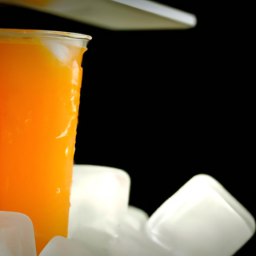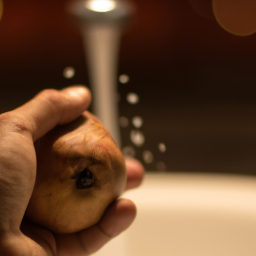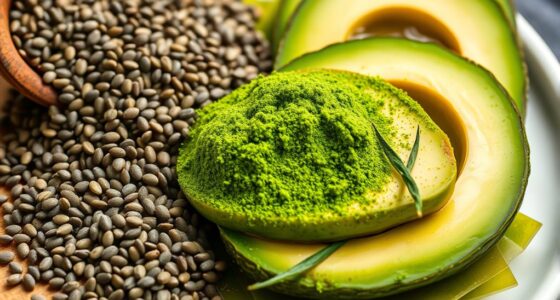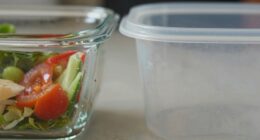In my kitchen, surrounded by piles of juicy oranges, I feel a surge of excitement. I know that with a little effort, I can savor this delicious fruit for months to come.
Freezing orange juice is a simple and effective way to ensure that you always have access to this nutritious and refreshing beverage. Imagine a hot summer day, the sun beating down on you mercilessly. All you can think about is a cool glass of orange juice, filled to the brim with ice cubes. With frozen orange juice on hand, you can satisfy that craving any time you want.
In this article, I will guide you through the process of freezing orange juice, from gathering your materials to thawing and using the juice. So, let’s get started!
Key Takeaways
- Wash oranges before juicing and remove any seeds and large chunks of pulp
- Use airtight containers or freezer-safe plastic bags for freezing orange juice and label and date them for freshness
- Thaw frozen orange juice in the refrigerator overnight for slow and even thawing
- Frozen orange juice can be used as is or in recipes, and pre-portioning juice into smaller containers reduces waste and allows for quicker thawing
Gather Your Materials
Now, you’ll wanna gather all your materials before you start freezing that delicious orange juice.
First, you’ll need to choose the right containers for freezing. I recommend using airtight containers or freezer-safe plastic bags to prevent air and moisture from getting in and affecting the quality of the juice. Make sure to choose containers that are the appropriate size for your needs, whether you want to freeze individual servings or larger batches.
Next, it’s important to properly wash your oranges before juicing them. The best way to wash oranges is to rinse them under cool running water and use a vegetable brush to scrub the surface gently. This will help remove any dirt or debris that may be on the skin.
Once your oranges are clean, you can start juicing them.
Wash and Juice the Oranges
Once you’ve gathered your fresh oranges, it’s time to give them a thorough wash before extracting their delicious nectar. Juicing techniques vary depending on the type of juicer you have, but the most important thing to remember is to remove any seeds and large chunks of pulp before juicing. Here are some tips to help you get the most out of your oranges:
- Wash the oranges under running water to remove any dirt or debris.
- Use a citrus juicer or a blender to extract the juice from the oranges.
- Cut the oranges in half and squeeze them by hand if you don’t have a juicer or blender.
- Use a strainer to remove any seeds and large pieces of pulp.
- Experiment with different orange varieties to find your favorite flavor.
Now that you have fresh orange juice, it’s time to prepare it for freezing.
Prepare the Orange Juice for Freezing
To get your orange juice ready for the freezer, start by pouring it into airtight containers or resealable bags. This will help prevent freezer burn and keep your juice fresh for longer.
When selecting oranges for juicing, choose ripe ones that are heavy for their size and have smooth, firm skin. Avoid oranges with soft spots or blemishes, as they may be past their prime.
To juice the oranges, cut them in half and use a citrus juicer or hand-held juicer to extract the juice. You can also use a blender or food processor to blend the oranges and strain the juice through a fine-mesh sieve.
If you want to freeze small portions of juice, consider using a standard ice cube tray, which can hold up to 1/4 cup of liquid.
Once you have prepared your orange juice for freezing, be sure to label and date the containers to keep track of when they were frozen. This will help ensure that you use up the juice before it starts to lose flavor or quality.
Label and Date the Containers
Labeling and dating your containers is a crucial step in preparing your orange juice for freezing. This simple task can help you keep track of your frozen juices and ensure their freshness.
When labeling your containers, make sure to include the date of preparation and the type of juice. This will help you keep track of how long the juice has been frozen and prevent any confusion when you’re looking for a specific flavor.
It’s also essential to use proper containers for freezing juices. Glass containers are an excellent choice because they’re non-reactive and won’t absorb any flavors or odors. Plastic containers are also okay, but make sure they’re BPA-free and can withstand freezing temperatures.
Additionally, consider organizing your frozen juices by flavor or date to make it easier to find what you’re looking for. These tips for labeling, storing, and organizing frozen juices can help you save time and reduce waste.
Now that your containers are labeled and ready to go, it’s time to place them in the freezer.
Place the Containers in the Freezer
Now that you’re ready to freeze your freshly prepared orange juice, all that’s left to do is pop the containers into the freezer and let them chill until you’re ready to enjoy a refreshing glass. But before you do that, here are a few things to keep in mind:
-
Freezing process: The freezing process can take anywhere from 6-12 hours depending on the temperature of your freezer. It’s important to note that the longer you leave the juice in the freezer, the more likely it is to lose its flavor and nutritional value. So, be sure to check on your juice frequently and remove it from the freezer as soon as it’s fully frozen.
-
Container options: When it comes to freezing orange juice, you have a few options for containers. You can use plastic containers, glass jars, or even ice cube trays. Plastic containers are the most popular choice as they’re lightweight, easy to stack, and come in a variety of sizes. Glass jars are a good option if you want to avoid plastic or if you plan on storing the juice for a longer period of time. Ice cube trays are great for portion control and can be easily popped into a glass when you’re ready to drink.
-
Leave room for expansion: No matter which container you choose, be sure to leave some room for the juice to expand as it freezes. If you fill the container up to the brim, the juice may expand and crack or break the container.
-
Label and date: Before placing the containers in the freezer, don’t forget to label them with the date and contents. This’ll help you keep track of how long the juice has been frozen and ensure that you’re consuming it before its quality deteriorates.
With your containers labeled and filled with freshly squeezed orange juice, you’re ready to freeze them and enjoy a refreshing glass any time you want. But what if you want to enjoy the juice right away? In the next section, we’ll discuss how to thaw frozen orange juice quickly and safely.
Thawing Frozen Orange Juice
Now that we’ve learned how to freeze orange juice, let’s discuss how to thaw it.
There are two main methods to thaw frozen orange juice: in the refrigerator and on the counter. Thawing in the refrigerator is the recommended method as it allows for a slow and even thaw, maintaining the quality and flavor of the juice. However, if you’re short on time, thawing on the counter is also an option.
Thawing in the Refrigerator
First, you’ll want to take your frozen orange juice out of the freezer and place it in the refrigerator to thaw slowly. By doing this, you’ll preserve the flavor and texture of the juice, making it taste just as delicious as the day you froze it. Thawing in the refrigerator is the safest and most effective method for defrosting frozen orange juice. Not only does it ensure that the juice maintains its quality, but it also reduces the risk of harmful bacteria growth.
To ensure that the thawing process goes smoothly, it’s important to store your orange juice in the refrigerator before freezing. This is known as refrigerator storage and it involves keeping the juice at a temperature of 40°F or lower. Additionally, pre-portioning the juice into smaller containers before freezing has numerous benefits. It makes it easier to thaw only the amount of juice needed, reduces waste, and allows for quicker thawing times. By following these simple steps, you’ll be able to enjoy perfectly thawed orange juice every time. In the next section, we’ll discuss another method of thawing frozen orange juice – thawing on the counter.
Thawing on the Counter
For a quicker thawing method, you can try leaving your frozen orange juice on the counter, but be warned that this method comes with some risks. Room temperature thawing can lead to bacterial growth, which can cause foodborne illnesses. However, if you follow some basic guidelines, this method can work well.
Here are the benefits of freezing orange juice and the steps to safely thaw it on the counter:
-
Freezing orange juice allows you to enjoy the taste and nutritional benefits of fresh juice for months.
-
To thaw orange juice on the counter, remove it from the freezer and place it on a plate or in a bowl to catch any drips.
-
Leave it at room temperature for 2-3 hours, or until completely thawed.
-
Once thawed, stir the juice well and refrigerate it until ready to use.
To use frozen orange juice, you can either drink it as is or use it in recipes that call for fresh juice. Now that your orange juice is thawed and ready to use, let’s explore some delicious ways to incorporate it into your cooking.
Using Frozen Orange Juice
To enjoy your frozen orange juice, simply thaw it in the fridge overnight and give it a good shake before pouring yourself a refreshing glass!
Once thawed, you can use your frozen orange juice in various recipes that call for fresh orange juice. The benefit of using frozen orange juice is that it lasts longer than fresh juice and can be used whenever you need it.
Using frozen orange juice in recipes is a great way to add a burst of citrus flavor to your dishes. You can use it in marinades, dressings, smoothies, or even bake with it. The possibilities are endless!
But if you prefer a more concentrated orange flavor, you may want to try freezing orange juice concentrate instead.
Freezing Orange Juice Concentrate
You won’t believe how easy it is to transform a small can of orange juice concentrate into a powerhouse of flavor for your recipes! Freezing orange juice concentrate is a simple process that can help you save time and money while adding a burst of citrusy goodness to your dishes.
To freeze orange juice concentrate, all you need to do is pour the contents of the can into a freezer-safe container and place it in the freezer. With this simple step, you can have a delicious ingredient on hand whenever you need it.
Orange juice concentrate is not only convenient, but it also offers a range of nutritional benefits. It’s a great source of vitamin C and other antioxidants that can help boost your immune system. Plus, it’s low in calories and fat, making it a healthier alternative to other sweeteners in your recipes.
With a little creativity, you can use frozen orange juice concentrate to make everything from salad dressings to marinades and desserts. Looking for other citrus fruits to freeze? Try freezing lemon or lime juice. Just like orange juice concentrate, they can add a zesty flavor to your recipes without the hassle of squeezing fresh citrus.
With these frozen juices on hand, you can easily add a delicious twist to your dishes and enjoy the nutritional benefits of these citrus fruits.
Other Citrus Fruits to Freeze
Transforming your recipes with the zesty flavors of frozen lemon or lime juice is a simple and delicious way to add a burst of citrus to your dishes. Freezing lemon juice is an excellent way to preserve the tangy flavor of this fruit for later use.
To freeze lemon juice, simply squeeze fresh lemons and pour the juice into an ice cube tray. Once the juice is frozen, pop out the cubes and store them in a freezer-safe container for up to six months. Frozen lemon juice cubes are perfect for adding flavor to marinades, cocktails, and desserts.
Grapefruit juice is another citrus fruit that can be easily preserved by freezing. Preserving grapefruit juice is an excellent way to enjoy the tart and tangy flavor of this fruit year-round.
To freeze grapefruit juice, simply squeeze fresh grapefruit and pour the juice into an ice cube tray. Once the juice is frozen, pop out the cubes and store them in a freezer-safe container for up to six months. Frozen grapefruit juice cubes can be used to add flavor to smoothies, cocktails, and other recipes that call for grapefruit juice.
Frequently Asked Questions
Can I use frozen oranges instead of fresh ones to make orange juice for freezing?
I tried using frozen oranges for orange juice and found it to be just as delicious and nutritious as using fresh ones. Freezing preserves the nutritional benefits and the juice can be stored for longer periods of time.
How long can I keep frozen orange juice in the freezer before it goes bad?
Frozen orange juice can last up to 12 months in the freezer if stored properly. Best storage practices include using airtight containers or freezer bags, removing excess air, and labeling with the date. Different freezing methods may affect shelf life.
Can I add sugar or other sweeteners to the orange juice before freezing it?
Yes, sweeteners can be added to orange juice before freezing it. However, it’s recommended to add them after thawing to ensure proper blending. Use airtight containers, leaving some space for expansion, for the best results.
Can I freeze freshly squeezed orange juice that contains pulp?
Did you know that freezing pulp containing orange juice can alter its texture? To avoid this, strain the juice before freezing. Store the frozen orange juice in airtight containers and use within 2-3 months. Tips and tricks for freezing pulp containing juice. Best practices for storing frozen orange juice.
Can I use plastic bags instead of containers to freeze the orange juice?
Yes, plastic bag alternatives can be used to freeze orange juice. However, the freezing time may be longer compared to using containers. It is important to ensure the bags are sealed tightly to prevent freezer burn.
Conclusion
Well, it turns out that freezing orange juice isn’t rocket science. It’s a simple process that anyone can do with the right materials and a few easy steps.
And yet, despite its simplicity, freezing orange juice can be a game-changer for those who love the taste of fresh-squeezed orange juice but don’t have the time to make it every morning.
But let’s be real here. Who wants to freeze orange juice when you can just buy it at the store? I mean, why go through all the trouble of washing and juicing oranges, preparing the juice for freezing, and labeling and dating containers, when you can just grab a carton of orange juice off the shelf?
It’s ironic, really. We live in a world where convenience is king, yet we’re still willing to go the extra mile for something as simple as orange juice. But hey, if you’re a true orange juice connoisseur, then freezing your own juice might be worth it.









